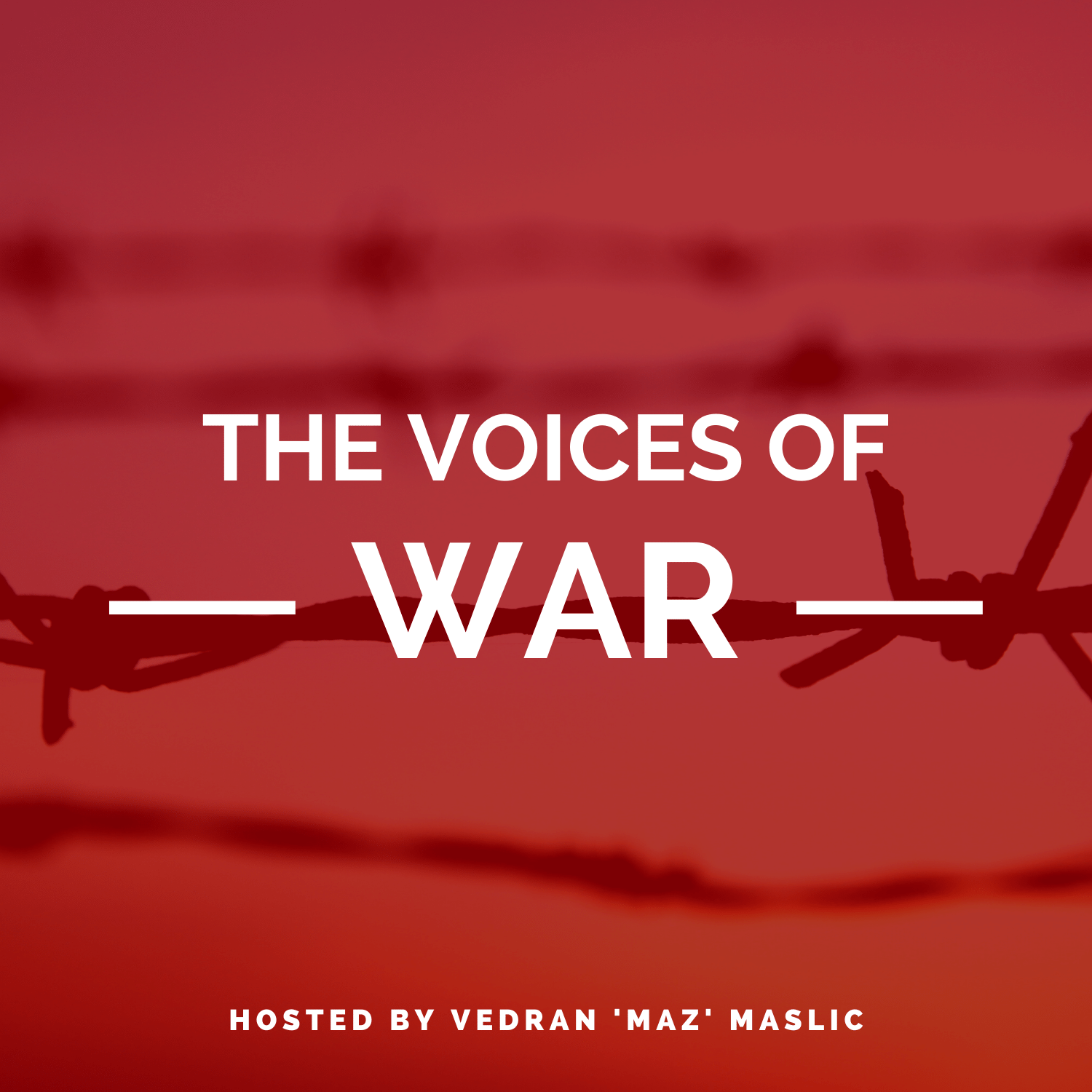
‘The Voices Of War’ is guided by a simple vision—to scratch below the simple narratives of war through the voices of those who understand its complexities.
To do this, I speak with refugees, soldiers, negotiators, academics, development workers, and anyone else whose life has been shaped by war, be they a survivor, a perpetrator, a mediator, a student, or a healer of it.
Ultimately, I want to make it lucid that neither war nor peace is a forgone conclusion. Both are a product of upstream causes that make one or the other more likely. Understanding and embracing this fact is critical when trying to find moral and ethical solutions to our many local, regional, and global challenges.
Episodes
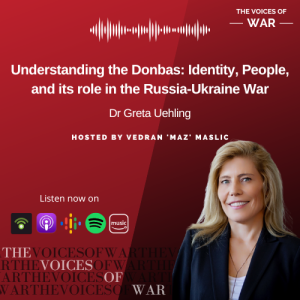
Thursday Feb 27, 2025
Thursday Feb 27, 2025
Today, I spoke with Dr Greta Uehling, who is a lecturer at the University of Michigan and whose scholarship is concerned with international migration and forced displacement. Her most recent project explored the subjective experience of the military conflict and forced displacement in Ukraine. Based on years of research living in Ukraine, she documented how the military conflict that started in 2014 reconfigured social worlds and how these social worlds became the site of a different, everyday kind of war. She recently published a book stemming from this research titled ‘Everyday War: The Conflict over Donbas, Ukraine’.
Some of the topics we covered are:
· Greta's background, entry into anthropology, and her fieldwork in Ukraine
· The birth of her book 'Everyday War: The Conflict over Donbas, Ukraine'
· Meaning and manifestations of 'Everyday War'
· Unique identity of the Donbas in Ukraine and its role in the Russia-Ukraine conflict
· Importance of cultural and social immersion for understanding context
· Perception differences of the war in different parts of Ukraine (2014-2022)
· Impact of war on interpersonal relationships and fallout management strategies
· Defining and contextualising 'Everyday Peace'
· The story of the 'Black Tulips'
· Influence of war on risk perception and redefinition of 'normal'
· Prospects of peace in Ukraine
During this episode, I referred to a discussion with a previous guest, Tomislav Cvitanusic. You can listen to that episode here.
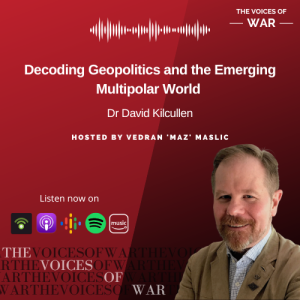
Thursday Feb 27, 2025
90. Dr David Kilcullen - Decoding Geopolitics and the emerging Multipolar World
Thursday Feb 27, 2025
Thursday Feb 27, 2025
My guest today is Dr David Kilcullen, who is a renowned military strategist, scholar, and former soldier and diplomat who has served both the Australian and United States governments for three decades now. He is an expert in the fields of guerrilla warfare, terrorism, urbanisation, and the future of conflict.
David has authored several influential books, including ‘The Accidental Guerrilla’, ‘Counterinsurgency’, ‘Out of the Mountains’, ‘The Dragons and Snakes: How the Rest Leant to Fight the West’ and ‘The Ledger: Accounting for Failure in Afghanistan’. He has been named one of Foreign Policy's Top 100 Global Thinkers and has won numerous awards for his writing. His work is widely used by policymakers, the military, intelligence services, and development agencies around the world.
Some of the topics we discussed are:
· David’s background, military life, and journey into academia
· Analysis of the fall of Kabul and the current situation in Afghanistan
· Reflection on the power and influence of elites in the US and how their pursuit of selfish interests affects geopolitics
· Competing partisan narratives in the US and their impact on global politics
· Lack of accountability for the failures in Afghanistan and Iraq and its impact
· Working towards preventing a potential war between the US and China as a national priority for Australia
· Discussion on the likelihood and impact of a hot war between the US and China
· Analysis of what the US-China contest is actually about
· A discussion on the winners and losers in the 20th century
· Reflection on Iraq as a pivotal moment for US global dominance
· Loss of Western moral legitimacy and its impact
· Australia’s position in a potential US-China conflict
· Reflection on the recently announced Australian Defence Strategic Review
· How Taiwan perceives China and how this shapes its strategic narrative
· Reflection on the Russian invasion of Ukraine, its origins, and potential outcomes
· China’s attempt to mediate between Ukraine and Russia, as well as Iran and Saudi Arabia
· How social media undermines conflict discourse and stifles dialogue due to parallel realities
· The importance of national sovereignty, industry, resilience, and sustainability
· Discussion on the fact that increased sovereignty would impact the current standard of living and national wealth
· Impact of the collapse of confidence in experts, institutions, and the political elite in the West
· Reflection on the ongoing domestic tensions in the US and the risks associated with the 2024 presidential election
· Dave's two key risks for the immediate future—ongoing erosion of civil liberties in the West and a weaponised pandemic
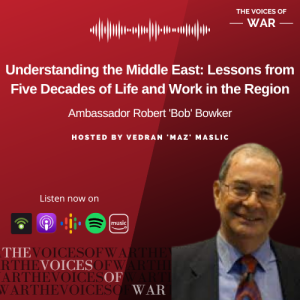
Thursday Feb 27, 2025
Thursday Feb 27, 2025
My guest today is Dr Robert ‘Bob’ Bowker whose career in the politics and analysis of the Middle East spans five decades. He spent 37 years as an Australian diplomat in the region, firstly on postings to Saudi Arabia (74-06), and Syria (79-81) and later as the Australian ambassador to Jordan (89-92), Egypt (05-08) as well as non-resident ambassador to Syria, Libya, Tunisia, and Sudan. Bob also held senior roles at the United Nations Relief and Works Program for Palestine Refugees in the Near East (1997-1998,) based in Gaza and Jerusalem.
Following his diplomatic career, Bob spent more than a decade as an academic, firstly as an Adjunct Professor and later as an Honorary Fellow at the ANU Centre for Arab and Islamic Studies. For a period of that time, Bob also served as an intelligence analyst with the Office of National Assessments.
Bob recently published a memoir about his extensive career and personal attachment to the Middle East titled, ‘Tomorrow There Will Be Apricots: an Australian Diplomat in the Arab World’. Bob joins me today to discuss his book as well as his views on the state of the Middle East, its predominant and enduring fault lines, as well as the role of the West in the region.
Some of the topics we covered are:
· Bob’s introduction to Islam and the Arab World
· Misrepresentation of the Arab World’s relationship with the West
· Meaning of the book’s title and why it captures the sentiment of the Middle East
· Importance of cross-cultural engagement for diplomatic success and understanding of power structures
· Memorable cultural exchanges and their impact
· The importance of history to societies of the Middle East
· Western politicians' failure to consider culture and history when dealing with the Middle East
· Analysis of the 2003 Iraq Invasion, its background, and failures
· Australia’s involvement in the Iraq War
· Whether Australia should debate a decision to go to war in the Parliament
· Reconciling the tensions between national interests and promoting certain values
· Bob’s work in Palestine with United Nations Relief and Works Program for Palestine Refugees in the Near East (UNWRA)
· Analysis of the Palestine and Israel conflict and why peace remains untenable
· Why the ‘Two State Solution’ is dead
· The unwavering US support for Israel and the possibility of change
· The future of Iran’s relationship with the West and the US
· Prospects of Chinese success in mediating between Iran and Saudi Arabia
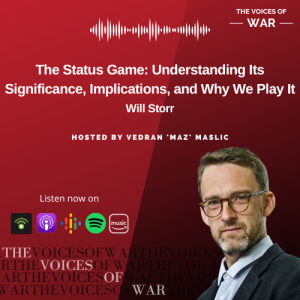
Thursday Feb 27, 2025
Thursday Feb 27, 2025
Today, I spoke with Will Storr, who is an award-winning writer whose work has appeared in titles such as The Guardian, The Sunday Times, The New Yorker and The New York Times. He is the author of six critically acclaimed books, including ‘Selfie: How the West became self-obsessed’, ‘The Heretics: Adventures with the enemies of science’, as well as the Sunday Times Bestseller ‘The Science of Storytelling’.
He also recently published the book 'The Status Game: On Human Life and How to Play It' and he joins me today to explore how status influences our behaviour, relationships, and how it contributes to so much of what’s good as well as bad in our world.
Some of the topics we covered are:
The Significance of Status: Understanding Its Purpose and Implications
Dominance, Virtue, and Success: The Three Types of Status Games You Need to Know
Cultural Influence on Status Games: Why Understanding Culture is Key
Influencing Social Groups: The Importance of Understanding their Culture and Status Dynamics
The Impact of Status on Physical and Psychological Wellbeing: What You Need to Know
Status Loss and Suicide Ideation: Understanding the Correlation
Genocide and National Status Loss: Examining the Link
Status in Culture Wars: Brexit, Trump, and the Role of Status Games
The Use of Status Games by Cultural Elites
Geopolitics and Status: Understanding Their Interconnection
Escaping Status Games: Is It Possible?
Playing a Hierarchy of Status Games: Why It Matters and How to Do It
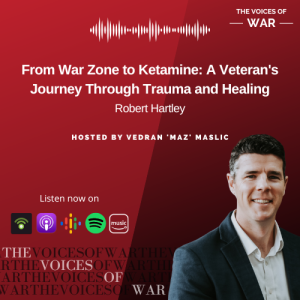
Thursday Feb 27, 2025
Thursday Feb 27, 2025
Please note that this entire episode is available on the public channel. To gain access to all other episodes, please subscribe at https://thevoicesofwar.supercast.com/
----
Today, I spoke with Robert Hartley, who is a former Australian Army Officer who served for 12 years in the Artillery Corps before transitioning to a civilian career in the technology sector. During his time in the military, Robert deployed on exchange with the British Army on Operation Herrick XII (12) to Helmand Province, Afghanistan in 2010. In his civilian life, Robert has worked for a number of technology companies, including Microsoft, before joining a start-up where he is an Executive Director.
Robert joins me today to discuss his life in the Army, how his deployment to Helmand resulted in a PTSD diagnosis, as well as his journey to recovery, which includes being part of the ketamine program that I discussed at length with Dr Alex Lim a few episodes ago.
Things we covered include:
Rob’s entry into the Army and the Artillery Corps
Rotation into Helmand with the British Army
The thrill of preparing for and going to war
Use of artillery as a direct-fire weapon
The reality of Helmand as the ‘kinetic province’
How the local population perceived the Coalition Forces
Dealing with numerous casualties
Reflecting on mateship, camaraderie, and sense of purpose
The process of desensitisation to war and combat
Reflection on the burden of command
The challenge of preserving one’s own moral compass
The struggle of upholding the delicate facade of morality in battle
The price of extreme compartmentalisation and rationalisation
Returning home, signs that things weren’t right and asking for help
Symptoms, PTSD diagnosis, and importance of command support
Short-term fixes but eventual relapse, downward spiral, and continual emotional compartmentalisation
The path to recovery and reconnecting to emotions
Joining Dr Alex Lim’s ketamine program, onboarding, and treatment initiation
A reflection on the ketamine treatment, its sensations, experiences, and insights
Why ketamine remains contentious
How the ketamine treatment affected Rob’s relationships with his wife and children
Why seeking help matters!
During this discussion, we referred to the following previous episodes:
Ashley Judd – On combat, mental health and the road to recovery
Dr Alex Lim - On veterans’ mental health: the good, the bad and the promising
Given the nature of this discussion, and the fact that many in our audience are veterans, there is a risk that elements of this episode might be difficult listening for some. If this is the case, I encourage you to seek help through one of the many channels nowadays available, some of which are listed below (Australian audiences only):
All-hours Support Line
(1800 628 036 / +612 9425 3878 if O/S)
Open Arms (VVCS)
1800 011 046
https://www.openarms.gov.au/
1800 IMSICK
(1800 624 608)
Defence Community Organisation (DCO)
Defence Family Helpline
1800 624 608
http://www.defence.gov.au/dco/
Lifeline
13 11 14
https://www.lifeline.org.au
Suicide Call back service
1300 659 467
https://www.suicidecallbackservice.org.au
Soldier On
1300 620 380
www.soldieron.org.au
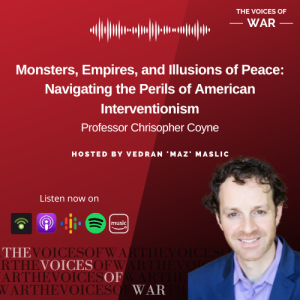
Friday Jul 05, 2024
Friday Jul 05, 2024
Today, I spoke with Dr Christopher Coyne, who is a Professor of Economics at George Mason University and the Associate Director of the F. A. Hayek Program for Advanced Study in Philosophy, Politics, and Economics at the Mercatus Center.
He is the author of five books and numerous academic articles, book chapters, and policy studies. He joins me today to discuss his latest book, In Search of Monsters to Destroy: The Folly of American Empire and the Paths to Peace (2022), which is a pragmatic and unashamedly critical appraisal of American foreign policy.
Some of the things we talked about are:
Chris’ background and entry into academia and
How and why training in economics shaped Chris’ worldview
Importance of understanding incentives and their power
An argument against the concept of a 'Hobbesian world'
Definition of the American Empire and its governance of 'dominion'
Dangers of crony capitalism and its ties to the Military Industrial Complex
Issues with broken or non-existent chains of accountability
Concerns surrounding the 'revolving door' principle
Origins of US militarism and the Permanent War Economy
Military Keynesianism and the 'Iron Triangle'
Limitations and unintended consequences of American interventionism
Unpredictability of complex systems
Impact of technological advances and the shift from 'defence' to 'offence'
Exploring alternatives to war
Previous episodes that address similar topics and were referenced in this discussion include:
Samuel Moyn - On ‘Humane: How the United States Abandoned Peace and Reinvented War‘
Marc Garlasco - War through the eyes of a Pentagon Chief of High Value Targeting
Amos Fox - Beyond the illusion of manoeuvre: Navigating the clash between intentions and reality in modern warfare
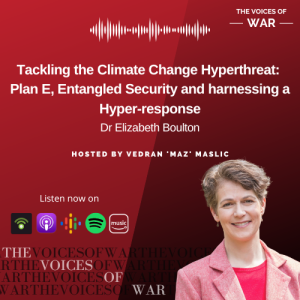
Monday Mar 13, 2023
Monday Mar 13, 2023
My guest today is Dr Elizabeth Boulton, who is an eco-military theorist with Destination Safe Earth, and a research affiliate with the ‘Climate Change & (In)Security Project’ which is a collaboration between the University of Oxford, the Centre for Historical Analysis and Conflict Research (CHACR) and the British Army.She joins me today to discuss her thinking behind the concepts of ‘Hyperthreat’, ‘Hyper-response’, and Plan E as a response to tackling climate change. Some of the topics we discussed are:• Elizabeth’s background and journey towards a PhD• Timothy Morton and the Hyperobject• Conceptualising climate change as a ‘Hyperthreat’ • Uncovering the disguised cause and effect of the ‘Hyperthreat’• ‘Entangled Security’ and why understanding it is crucial for tackling the climate crisis• The problem of establishing credibility about climate change• Corporate capture, competing priorities and corrupted incentives in the ‘Hyperthreat’• ‘Plan E’ and the essential steps to fight climate change• Reframing the idea of security for a sustainable future• Why a localised response is key to addressing the climate change ‘Hyperthreat’• Unlocking global creativity to achieve a ‘Hyper-response’• Testing the viability of ‘Plan E’ through wargaming• Increasing geopolitical tensions as a threat to climate change solutionsTo find out more about Elizabeth and her work, you can start here. #TheVoicesOfWar #PlanE, #hyperthreat, #EntangledSecurity, #ClimateChange, #Hyperobject, #Strategy, #ClimateEmergency, #Mobilization, #Transdisciplinary, #PlanetarySecurity, #SlowViolence, #SixthExtinctionEvent

Monday Feb 27, 2023
Monday Feb 27, 2023
My guest today is Amos Fox, who is an officer in the US Army with more than 24 years of service in uniform. Amos has written extensively on war and conflict over the past decade, producing over 60 publications. His work focuses on causal mechanisms to explain patterns in armed conflict. Much of Amos’ current writing addresses proxy war, land warfare, the Russo-Ukrainian War, and military thinking.
He joined me to discuss some of his views on the state of Western military thinking, particularly our potential over-reliance on the concept of manoeuvre warfare. Some of the topics we covered are:
Amos’ background in the military and path into academia
Influences of Amos’ first operational deployment in Iraq
Understanding the reality on the ground – when intentions clash
Defining manoeuvre warfare and its adoption by Western militaries
Lack of pragmatism and reality in Western doctrine – what you need to know
Why accurate and relevant doctrine matters for success in war
Learning from Liddell Hart and his relevance today
Debunking the illusion of manoeuvre in modern battles
Avoiding misapplication of past terminology in today's warfare
Battle of Mosul – Western usage of sieges examined
The Precision Paradox – what it means for modern warfare
Expanding doctrine to include Sieges, Urban Warfare, Proxy Warfare and re-imagined combined arms/joint warfare
Russian invasion of Ukraine – A case in point for modern warfare
The importance of questioning preconceived ideas for effective learning
During our chat, I made reference to my conversation with Marc Garlasco, Chief of High Value Targeting at the Pentagon between 1997 and 2003 where he led targeting teams during operations Iraqi Freedom, Desert Fox, and Allied Force. You can find that episode here.
Additionally, you can find all the articles Amos mentioned at the links below:
"Moving Beyond Mechanical Metaphors: Debunking the Applicability of Centers of Gravity in 21st Century Warfare," The Strategy Bridge, https://thestrategybridge.org/the-bridge/2017/6/2/moving-beyond-mechanical-metaphors-debunking-the-applicability-of-centers-of-gravity-in-21st-century-warfare.
"Ukraine and Proxy War: Improving Ontological Shortcomings in Military Thinking," Association of the United States Army, Land Warfare Paper 148, https://www.ausa.org/sites/default/files/publications/LWP-148-Ukraine-and-Proxy-War-Improving-Ontological-Shortcomings-in-Military-Thinking.pdf
"Maneuver is Dead? Understanding the Conditions and Components of Warfighting," RUSI Journal, https://doi.org/10.1080/03071847.2022.2058601.
"On Sieges," RUSI Journal, https://doi.org/10.1080/03071847.2021.1924077.
"The Reemergence of the Siege: An Assessment of Trends in Modern Land Warfare," Institute of Land Warfare, Land Power Essay 18-2, https://www.ausa.org/sites/default/files/LPE-18-2-The-Reemergence-of-the-Siege-An-Assessment-of-Trends-in-Modern-Land-Warfare.pdf.
"Sieges in Modern War," Presentation delivered at Harvard Law School, 31 March-1 April 2021, http://dx.doi.org/10.13140/RG.2.2.31870.25929.
Lastly, Amos has extended an invite to anyone who may with to take this conversation further to email him on amos.c.fox@gmail.com.
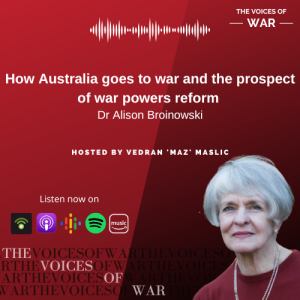
Monday Feb 13, 2023
Monday Feb 13, 2023
My guest today is Dr Alison Broinowski AM, who is an Australian academic, journalist, writer, and former Australian diplomat. She is also the President of Australians for War Powers Reform.
Alison joined me to explore the current debate on Australian troop deployment, compare it to other democracies, and discuss the possible outcome of the ongoing parliamentary enquiry into war powers.
Some of the topics we discussed are:
· Alison's background and motivation for war powers reform
· Changes in Australian defence policy during Prime Minister Howard's tenure
· Impact of Global War on Terror on defence and foreign policy
· The current approval process for military interventions
· Proposed changes to the war approval process and potential impact
· Benefits of a parliamentary vote for accountability
· Risks of inaction and views on Responsibility to Protect (R2P)
· Reflection on US hegemony and ANZUS treaty misunderstandings
· Arguments against war powers reform
· Possible impacts of Australian involvement in US-led wars
· Parliamentary inquiry outcome and report release timing
· Alison's greatest fears if war powers remain unchanged
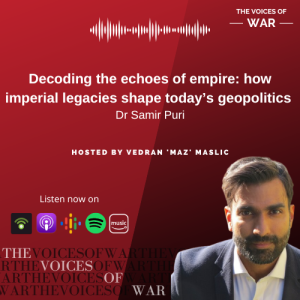
Sunday Jan 29, 2023
Sunday Jan 29, 2023
This a reminder that The Voices Of War is transitioning to a subscription model from February. More info here.
Those wishing to subscribe can already do so here.
---
My guest today is Dr Samir Puri, who is a visiting lecturer in War Studies at King’s College London and has previously taught at Cambridge and John Hopkins.
He joined me for a deep dive into his two most recent books. The first one, ‘The Great Imperial Hangover: How Empires Have Shaped the World’, explores how empires of the past still influence geopolitics today. And the second one, ‘Russia’s Road to War with Ukraine: Invasion amidst the ashes of empires’, published in late August, explores the role of imperialism in Putin’s ultimate decision to invade Ukraine and traces Ukraine’s fate as a nation caught in a geopolitical tug-of-war between Russia and the West.
Samir has also served as an international observer at five Ukrainian elections, including during the Orange Revolution in 2004. Soon after the first Donbas war began in 2014, he spent a year in east Ukraine working on both sides of the front line as part of an international ceasefire monitoring mission. Since Russia’s latest invasion of Ukraine, Samir’s analyses of the war have been featured by the BBC, Al Jazeera, Bloomberg, CNN, the Wall Street Journal, and other media outlets.
Some of the topics we discussed are:
Samir’s background and how it influenced his academic interests
Defining ‘empire’ and understanding the role of its legacy
Distinguishing between a formal and informal empire
The consequences of waning US hegemony and Pax Americana
The importance of history and lineage to national and individual identity
Understanding how imperial legacy contributed to Russia’s invasion of Ukraine
How Western democracies should navigate their imperial legacy
The significance of Ukraine for Russia and its imperial legacy
Proximity to history as crucial in shaping contemporary narratives
‘Great power contest’ as the present narrative
Exploring the structural reasons why Ukraine is currently a warzone
Understanding NATO and how it might be perceived outside of the alliance
Samir’s assessment of how the Russian invasion of Ukraine ends
Exploring the impact of the Russian invasion on Chinese post-imperial aspirations
Samir’s greatest concern as we head into 2023
dr Samir Puri podcast, latest dr Samir Puri podcast, dr Samir Puri podcast 2023, dr Samir Puri podcast on geopolitics
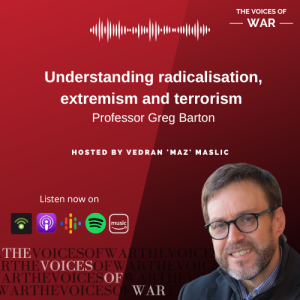
Monday Jan 09, 2023
Monday Jan 09, 2023
This a reminder that The Voices Of War is transitioning to a subscription model from February. More info here.
Those wishing to subscribe can already do so here.
---
Today, I’m speaking with Professor Greg Barton, who is a Research Professor in Global Islamic Politics at Deakin University. Greg is one of Australia’s leading scholars of radicalisation, terrorism and countering violent extremism. He is frequently interviewed by the Australian and international media on these topics as well as on Indonesia and the politics of the Muslim world.
He joins me today for a deep dive into radicalisation, extremism, and terrorism as well as their causes and potential solutions.
Some of the topics we explored are:
Greg’s background and research in countering violent extremism (CVE)
Defining radicalisation, extremism, and terrorism
The explanation why Russia is not designated a terrorist state
Terrorism as a method
Dangers of ‘thought policing’
How to deal with extremism before it becomes violent
Explaining the ‘Push, Pull, Personal factors’ model to understand radicalisation
Systemic hate and its potential to fuel hateful extremism, violent extremism, and conflict violence
Similarities between recruiting into a military and a terrorist group
The role of social media in radicalisation
How online radicalisation occurs
Combating extremist propaganda
Effectiveness of counter-terrorism measures
The short-sightedness of military solutions to combat terrorism
How to prevent violent extremism
The Indonesian success in combating violent extremism as a case study
The growing threat of far-right extremism
Authoritarian populism as a key motivator behind far-right extremism
The potential risks of military veterans joining far-right groups
Pragmatic reflection about the risk to democracy in the US
Greg’s biggest fears for the next decade
Professor Greg Barton podcasts, understanding radicalisation podcasts, radicalisation podcasts 2023, understanding extremism podcast 2023, Professor Greg Barton podcasts, professor greg barton podcast on terrorism
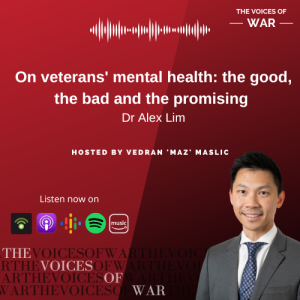
Friday Dec 23, 2022
Friday Dec 23, 2022
This a reminder that The Voices Of War will adopt a subscription model. You can hear the explainer here.
You can subscribe to the new channel here.
--
My guest today is Dr Alexander YC Lim, who is an Adjunct Associate Professor of Medicine with the Queensland Brain Institute. He is a Psychiatrist in private practice, and now almost exclusively looks after members of the Australian Defence Force, the Australian Federal Police, and the veteran community more broadly.
In 2019, Dr Lim set up Australia’s first integrated ketamine program for veterans, known as the ReVive Ketamine Program. Starting in February 2023, this program will become the subject of an ethics-approved clinical study into the long-term effectiveness and safety of ketamine for treatment-resistant depression and treatment-resistant PTSD.
Dr Lim joined me today to discuss some of the mental health challenges faced by our veteran community and to shed light on some emerging treatments that could aid them on their path to wellness.
Some of the topics we covered are:
Dr Lim’s entry into psychiatry and veteran mental health
The current state of veteran mental health support
Difference between civilian and military/emergency services stressors
Understanding the impact of stress, trauma, and PTSD
Post-Traumatic Stress Disorder as a multi-system dysfunction
Total and Permanent Impairment and associated challenges
Moral injury and what causes it
How stress affects our physiology, decision-making ability, and ethical frameworks
The need to indoctrinate appropriate ethical frameworks as early as possible
Importance of developing trust between the patient and their clinician
Treating suicidality
Drop-out rates in traditional psychotherapy treatment
Why medications are not the ‘silver bullet’ for mental health concerns
Synaptic Disconnection Syndrome and the effect of PTSD on the structure of the brain
The issue of treatment-resistant illness and the promise of ketamine
Preliminary findings and prospects of ketamine for treatment-resistant illness
How to access the ketamine program for those with treatment-resistant illness
As mentioned in the introduction, you can find Australian Defence Force personnel suicide statistics here.
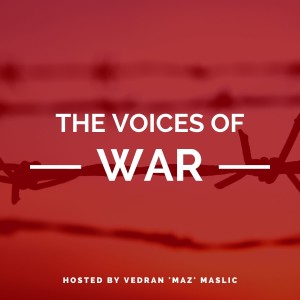
Tuesday Dec 20, 2022
79. Announcement of a significant change to The Voices Of War
Tuesday Dec 20, 2022
Tuesday Dec 20, 2022
To make the show sustainable into the future, The Voices Of War is adopting a subscription model starting in January 2023. Key points:
This channel will air full episodes until the end of January to allow those who wish to subscribe time to transition to the new channel
From February, this current channel will air only the first half of each episode and each episode will be bookended with a notice and link to the subscriber-only channel
The current library on this channel will remain unchanged and access to all previous episodes will remain open
The subscription fee will be $ 4 USD per month, which roughly equates to $6 AUD or €3.75
A discounted annual subscription will also be available (2 free months)
Other options will exist for those who wish to give more, however, all tiers will unlock the same subscription
For anyone experiencing financial hardship and who genuinely cannot afford a subscription, please email me on info@thevoicesofwar.com as I have an alternate option
Any educational facility that uses the show's episodes as pre-course listening need only email me and I will make the full audio file of your desired episodes available, free of charge
Link to the new subscriber only channel will be included in the show notes of all future episodes on this channel
Thank you for listening to The Voices Of War and I wish you a happy and safe festive season.
Maz
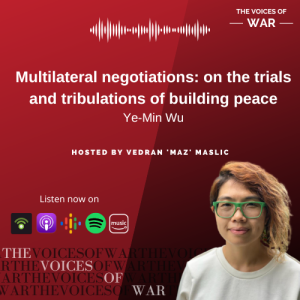
Monday Dec 12, 2022
Monday Dec 12, 2022
My guest today is Ye-Min Wu, who is the South & Southeast Asia Director at the Centre for Humanitarian Dialogue. Ye-Min joined HD earlier this year after more than 15 years as a diplomat representing Singapore at the United Nations, World Intellectual Property Organization, UN Framework Convention on Climate Change as well as the World Trade Organisation. She has also chaired UN negotiations and represented the Group of 77 (plus China) in talks on sustainable development issues.
She joins me today to discuss how multilateral negotiations are conducted and explains some of the challenges as well as opportunities inherent in the process. Some of the topics we covered are:
Ye-Min’s path into diplomacy
Managing the ‘negotiation theatre’
Finding the win-win solution
Building trust and credibility in negotiations
Connecting to the ‘other’ and the importance of warmth
How multilateral negotiations are conducted
The difference between a nation’s bargaining position and its interests
How to successfully negotiate in Asia
Challenges of growing militarisation and insecurity in Asia
How Asian nations are managing China’s rise
Why peace agreements often fail
Ye-Min’s greatest fear and hope
If you like what you’ve heard, please consider liking and reviewing the show wherever you get your pods. You can also support the show on our Patreon page here.
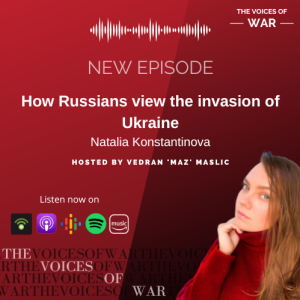
Monday Nov 28, 2022
Monday Nov 28, 2022
My guest today is Natalia Konstantinova, who is better known by her social media handle, Natasha from Russia. She is a popular Russian blogger and vlogger whose original aim was to help explain Russia to the outside world, but since her country's invasion of Ukraine, she has become a prominent voice about how this war is perceived in Russia.
Some of the questions we explored are: What does the average Russian believe is happening in Ukraine? How much support is there for the invasion of Ukraine in Russia? What information is consumed by Russians? What does Russian domestic propaganda look like? How are the ongoing military losses perceived in Russia? What are the impacts of sanctions on Russia?
Some other topics we covered are:
Commentating against the war from inside Russia
Challenges and support for protesters in Russia
Style of repression in Russia
Reality about elections in Putin’s Russia
How everyday Russians view the ongoing invasion of Ukraine
Reasons behind Russian apathy towards the invasion of Ukraine
Reflection on the impact of sanctions and how Russia is adapting
Information that is available in Russia and what Russians watch, read, and listen to
The dominance and influence of propaganda
What Russians know about the death of their soldiers
Natasha’s humanitarian efforts in Mariupol
You can follow Natasha on TikTok, Twitter, Instagram or Facebook, for more of her work.
If you like what you’ve heard, please consider liking and reviewing the show wherever you get your pods. You can also support the show on our Patreon page here.
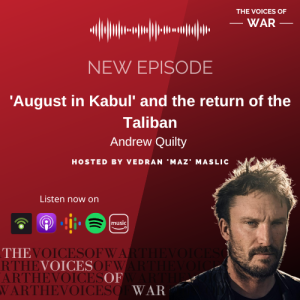
Monday Nov 14, 2022
76. Andrew Quilty - ’August in Kabul’ and the return of the Taliban
Monday Nov 14, 2022
Monday Nov 14, 2022
My guest today is Andrew Quilty, an Australian photojournalist, investigative journalist, and author. Andrew is the recipient of eight Walkley Awards, including the Gold Walkley, for his work in Afghanistan, where he has been based since 2013. He joined me to discuss his recently published book, August in Kabul: America's last days in Afghanistan, which is an intimate and deeply personal account of the fall of Kabul and the Taliban takeover of Afghanistan in August last year. Andrew was one of a handful of foreign journalists who remained in Kabul to witness and document this event.
Some of the topics we covered are:
Andrew’s exit from Afghanistan
Reflection on the birth and message of Andrew’s book ‘August in Kabul’
Hedging your bets as a means of survival in Afghanistan
The reality faced by everyday Afghans after the fall of Kabul
Reflection on the support for the Taliban throughout Afghanistan
The muddy nature of relationships across front lines
Why the Afghan government collapsed so quickly on 15 August 2021
The US-Taliban agreement in Doha
Impact of US military and logistical support withdrawal on the Afghan National Security Forces
Government lack of legitimacy in the eye of everyday people
The fall of Kabul on 15 August 2021 as observed from the ground
Survivor guilt and hardships of refugees
ISIS Kabul Airport attack and hell at Abbey Gate
US drone strike and impact of collateral damage
The reality and challenges of regime change
Andrew’s future
If you like what you’ve heard, please consider liking and reviewing the show wherever you get your pods. You can also support the show on our Patreon page here.
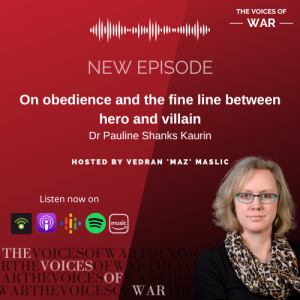
Monday Oct 31, 2022
Monday Oct 31, 2022
Today, I'm speaking with Dr Pauline Shanks Kaurin who is a Professor of Professional Military Ethics at the US Naval War College where she specialises in military ethics, just war tradition and applied ethics.
She is the author of ‘On Obedience: Contrasting Philosophies for Military, Citizenry and Community’, which is a book we discussed today. As you will find out, the subject matter this book addresses goes to the core of what it means to be a soldier and to be a citizen. Some of the topics we covered are:
Military ethics as the link between international relations and philosophy
Defining obedience
Discussion on ‘choice’ and moral responsibility
Impact of mis- and disinformation on agency
Trump, ‘Oath Keepers’ and obedience
How bias and heuristics impact responsibility
The cases of Ehren Watada and Stuart Schiller
The idea of ‘disciplined disobedience’
When epistemological worlds collide
Training for ‘critical obedience’
If you like what you’ve heard, please consider liking and reviewing the show wherever you get your pods. You can also support the show on our Patreon page here.
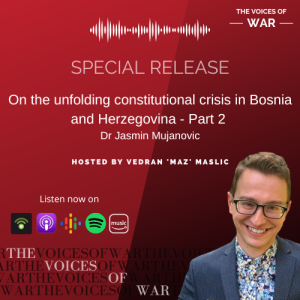
Thursday Oct 27, 2022
Thursday Oct 27, 2022
This is Part 2 of my discussion with Dr Jasmin Mujanovic. If you haven’t listened to part 1 yet, I suggest you do that first, as elements of the remainder of the conversation may otherwise seem out of context. You can listen to part 1 here.
Some of the topics we cover in this part are:
Details of the controversial electoral law amendment made by the High Representative
Perceptions, real or otherwise, of the High Representative’s bias and conflict of interest
Croat nationalism and its influence
The role of Croatia and Serbia in Bosnia’s integrity and sovereignty
EU vs NATO prospects for Bosnia and Herzegovina
What role Russia plays in the Western Balkans
The machinations to redesign the Western Balkans
Assessment of the likelihood of renewed violence in Bosnia and Herzegovina
Thank you for listening and if you’re getting value out of the show, please consider becoming a patron of The Voices Of War here.
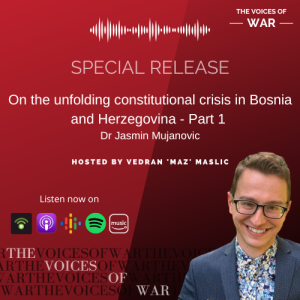
Monday Oct 24, 2022
Monday Oct 24, 2022
My guest today is Dr Jasmin Mujanovic, who is a political scientist and policy specialist in southeast European and international affairs. He has worked as a scholar, policy analyst, consultant, researcher, and writer in both North America and Europe.Jasmin’s academic research concentrates primarily on the politics of contemporary south-eastern Europe, with a particular focus on the politics of the non-EU states of the Western Balkans. He joins me today to discuss the unfolding constitutional crisis in Bosnia and Herzegovina. Some of the topics discussed in Part 1 are:
The political system of Bosnia and Herzegovina
Embedded tensions in Bosnian politics
Political actors in Bosnia and Herzegovina
Impact of Serb and Croat nationalism in Bosnia
Status of the 2nd of October general elections
Irregularities in the election
Victory of Pro-Bosnian candidates in the Federation entity
Attempts of further sectarian segregation by nationalists
Part 2 will be released on Thursday, 27th of October where we do a deep dive into the controversial decision by the High Representative to change the electoral law on the night of the elections. We also explore what this means for Bosnia and Herzegovina more broadly and what role regional and global powers play in the nation’s future.
If you like what you’ve heard, please consider liking and reviewing the show wherever you get your pods. You can also support the show on our Patreon page here.
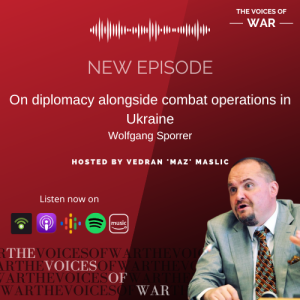
Friday Oct 21, 2022
Friday Oct 21, 2022
My guest today is Wolfgang Sporrer who is an Adjunct Professor at the Hertie School in Berlin and who was until 2020 the head of the Human Dimension Department of the OSCE in Ukraine.
Wolfgang has joined me on the show twice before, where we discussed the lead-up to the Russian invasion of Ukraine as well as the ultimate reasons and consequences of Putin’s decision to go to war. You can find links to those episodes here and here.
He joins me today to discuss the importance of diplomacy occurring in parallel to the war effort. Some of the topics we covered are:
Assessment of the current situation
Peace process and combat operations not mutually exclusive
Explaining mediation and different tracks
Relevance of a Mutually Hurting Stalemate
Appreciating the wide-ranging costs of the invasion
Expanding already existing dialogue mechanisms
Mediation must not have an end in mind
An example process with two tracks
German and Austrian sentiment towards the invasion
Military effort along with diplomacy essential
Focus on re-establishing European security architecture
If you like what you’ve heard, please consider liking and reviewing the show wherever you get your pods. If you can afford $AUD 5 per month, you can also support the show on our Patreon page here.




